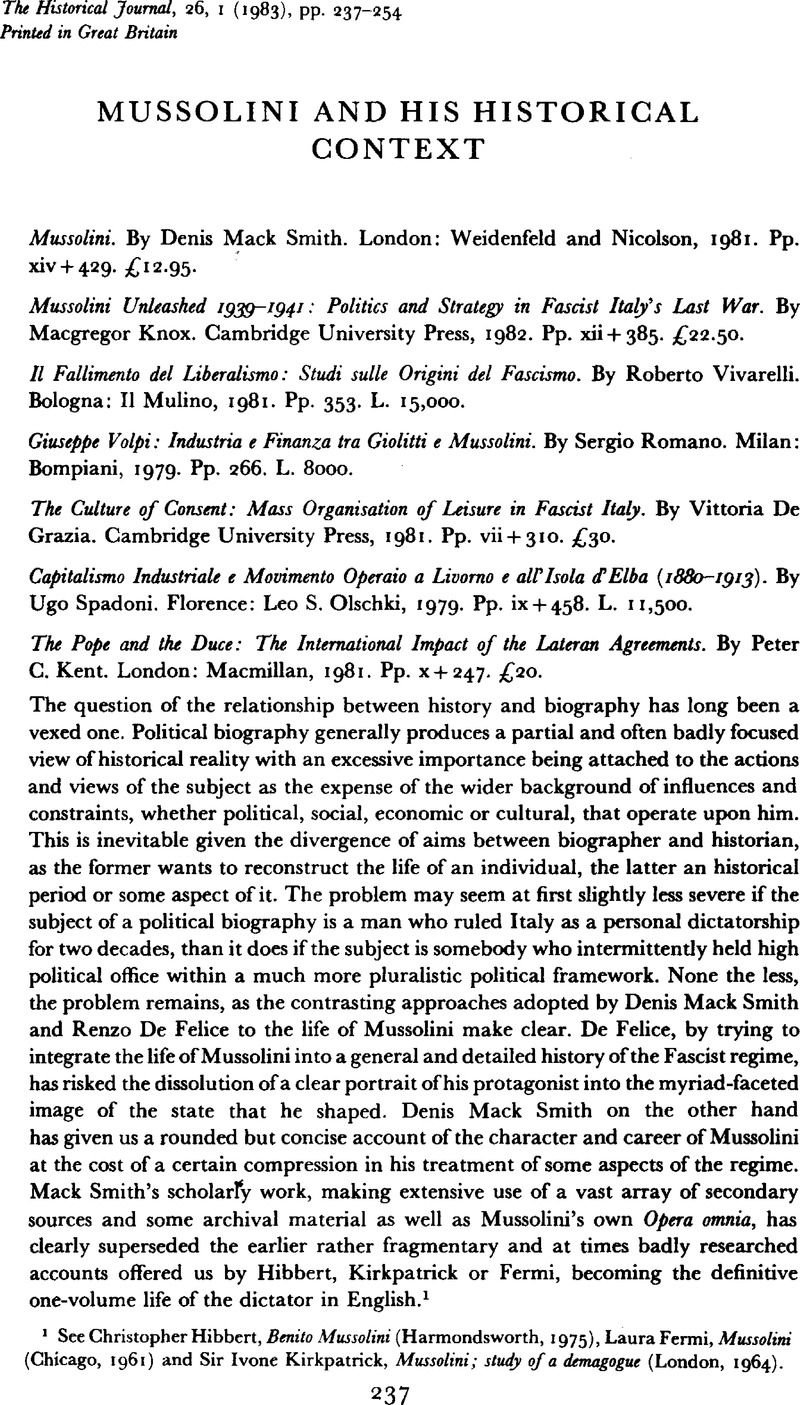No CrossRef data available.
Published online by Cambridge University Press: 11 February 2009

1 See Hibbert, Christopher, Benito Mussolini (Harmondsworth, 1975)Google Scholar, Fermi, Laura, Mussolini (Chicago, 1961)Google Scholar and Kirkpatrick, Sir Ivone, Mussolini; study of a demagogue (London, 1964).Google Scholar
2 Vivarelli, Roberto, Il dopoguerra in Italia e l'avvento del Fascismo (1918–1922). I. Dalla guerra alt impresa di Fiume (Naples, 1967).Google Scholar
3 Lyttelton, Adrian, Landlords, peasants and the limits of liberalism and Frank M. Snowden, From sharecropper to proletarian: the background to Fascism in rural Tuscany 1880–1920 in John A. Davis (ed), Gramsci and Italy's passive revolution (London, 1979)Google Scholar. Snowden, Frank M. has expounded the same ideas at greater length in ‘The social origins of Tuscan Fascism’ (Oxford D. Phil, thesis, 1974)Google Scholar as well as applying them more generally in ‘On the social origins of agrarian Fascism’, Archives européennes de sociologie, 1972, and his recent paper ‘Violence and social order: landlord and peasant in Apulia 1900–1922’, delivered in Cambridge on 17 February 1982. This approach has recently been challenged for lacking a political dimension by Richard Knowles in ‘Fascism in Mussolini's backyard: the case of Romagna’, a paper delivered in Oxford in October 1981.
4 Moore, Barrington Jr, The social origins of dictatorship and democracy: lord and peasant in the making of the modern world (London, 1967).Google Scholar
5 Seton-Watson, Christopher, Italy from Liberalism to Fascism 1870–1925 (London, 1978).Google Scholar
6 Smith, Denis Mack, Italy: a modem history (Ann Arbor, 1969).Google Scholar
7 Felice, Renzo De, Mussolini il rivoluzionario 1883–1920 (Turin, 1965).Google Scholar
8 Ledeen, Michael A., ‘Renzo De Felice and the controversy over Italian Fascism’, in Mosse, George E. (ed.), International Fascism (London, 1979).Google Scholar
9 Denis Mack Smith in the Times Literary Supplement, 31 October 1975.
10 Valiani, Leo, ‘Il partito Socialista Italiano dal 1900 al 1918’, Rivista Storica Italiana, LXXV (1963) 269–326Google Scholar, and Arfe, Gaetano, Storia del Sodalismo Italiano (1892–1926) (Turin, 1965).Google Scholar
11 Procacci, Giuliano, ‘Appunti in tema dello stato liberale e di origini del Fascismo’, Studi Storici, vi (1965).Google Scholar
12 Hobsbawm, E. J., Primitive rebels (Manchester, 1971), especially chapters 4 and 6.Google Scholar
13 Tannenbaum, Edward R., Fascism in Italy: society and culture 1922–1945 (London, 1973).Google Scholar
14 Enrico Mannari, Tradizione sovversiva e communismo durante il Regime Fascista 1926–1943: il caso di Livorno in Annali Feltrinelli, Milan, 1981.
15 Amyot, Grant, The Italian Communist party: the crisis of the Popular Front strategy (London, 1981).Google Scholar
16 Luisa Passerini, Italian Fascism and the working class: aspects of cultural conflict, paper delivered at Cambridge on 4 December 1981.
17 Passerini, Luisa, ‘Work ideology and consensus under Italian Fascism’, History Workshop Journal, 8, 82–108.CrossRefGoogle Scholar
18 Webster, Richard A., Industrial imperialism in Italy 1908–1915 (London, 1975)Google Scholar and Bonelli, Franco, Lo sviluppo di una grande impresa in Italia: la Tend dal 1884 al 1962 (Turin, 1975).Google Scholar
19 Pius XII's failure to act in defence of the Jews, even in Rome itself, emerges fairly clearly from Michaelis, Meir, Mussolini and the Jews: German-Italian relations and the Jewish question in Italy 1922–1945 (Oxford, 1978), especially pp. 364–9Google Scholar, although Michaelis, despite some hostile comments on pp. 376–7, attempts to avoid making a definite moral condemnation of the pope. Webster, Richard A. in The cross and the Fasces: Christian Democracy and Fascism in Italy (Stanford, 1960)Google Scholar and Tannenbaum, Edward in Fascism in ItalyGoogle Scholar pass a negative judgement on Pius XI and Pius XII in relation to Italian Fascism and German Nazism. What must be emphasized is that for both of these popes Bolshevik Russia was the Church's main temporal enemy, and all allies in the struggle against the USSR and international Communism were in some sense the Church's friends. In the light of the Vatican's lack of interest in the assassination of Archbishop Romero in San Salvador some might feel inclined to see this as a continuing thread in papal diplomacy.